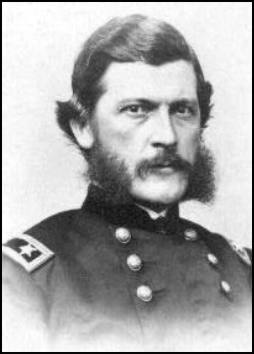John Grubb Parke (1827-1900)
John Grubb Parke was born on September 22, 1827, in Chester County, Pennsylvania. When he was young, he and his family moved to Philadelphia, Pennsylvania. Parke studied at a private academy, then at the University of Pennsylvania. Obtaining an appointment to the US Military Academy at West Point, he graduated in 1849.
 As a lieutenant in the Army Engineering Corps, he surveyed areas in Minnesota, New Mexico Territory, California and Washington Territory, determining the boundary-lines between Iowa and the Little Colorado river, and making the surveys for a railroad from the Mississippi river to the Pacific Ocean. He became 1st lieutenant of topographical engineers on July 1, 1856, and was chief astronomer and surveyor in the delimitation of the northwestern boundary between the United States and British America from March 2, 1857, until the beginning of the Civil War.
As a lieutenant in the Army Engineering Corps, he surveyed areas in Minnesota, New Mexico Territory, California and Washington Territory, determining the boundary-lines between Iowa and the Little Colorado river, and making the surveys for a railroad from the Mississippi river to the Pacific Ocean. He became 1st lieutenant of topographical engineers on July 1, 1856, and was chief astronomer and surveyor in the delimitation of the northwestern boundary between the United States and British America from March 2, 1857, until the beginning of the Civil War.
When the Civil War began, Parke became captain of engineers, and was a Union brigadier general as of November 23, 1861. Taking part in the North Carolina expedition, he fought at Roanoke Island and New Berne, North Carolina in 1862, receiving the brevet of lieutenant-colonel in the United States army for services in the capture of Fort Macon. Promoted to major general on July 18, 1862, he served as chief of staff of the 9th corps during the Maryland campaign, being engaged at South Mountain and Antietam, and in the pursuit of the enemy to Warrenton.
When General Burnside took command of the Army of the Potomac, General Parke was retained as his chief of staff, and was present at the battle of Fredericksburg.
After taking command of the IX Corps, he led it in Kentucky and in the campaign against Vicksburg, where he was a conspicuous actor. In the reoccupation of Jackson, Mississippi, he was in command of the left wing of General Sherman's army and was brevetted a colonel in the Regular Army to date from July 12, 1863.
He returned to Burnside's staff and fought with the Army of the Ohio in East Tennessee. In the East Tennessee campaign he was engaged at Blue Spring in the defence of Knoxville. for which he was subsequently brevetted brigadier-general, and in the following operations against General James Longstreet, after General Burnside resumed command of the corps, he led one of its divisions.
He was chief-of-staff to Burnside during the Overland Campaign in 1865 and during the beginning stages of the Siege of Petersburg. He was engaged at the battle of the Wilderness and the combats around Spottsylvania, but was then disabled by illness until August 13, 1864, when he resumed command of the IX Corps before Petersburg when Burnside was relieved of command after the Battle of the Crater. While Army of the Potomac commander George G. Meade was in a conference, Parke being senior officer was acting commander of the army during the battle of Fort Stedman until Meade returned to the field. He was brevetted major-general in the United States army for repelling the enemy's assault. He led the IX Corps through the fall of Petersburg and the Appomattox campaign.
In 1865 was brevetted a brigadier and major general in the Regulars for his service at Knoxville and Fort Stedman, and remained in the volunteer service until January of 1866.
He had been commissioned as major in the Corps of Engineers on June 17, 1864. After commanding the districts of Alexandria and southern New York, he resumed charge of the northwestern boundary survey on September 28, 1866. He superintended the repair and construction of fortifications in Maryland in 1867-68, and was on duty in the office of the Chief of Engineers at Washington, D. C., from June 1, 1868. He was promoted lieutenant-colonel of engineers on March 4, 1879, and colonel on March 17, 1884, and in June 1887, was appointed commandant of West Point, serving until his retirement in 1889.
He is the author of reports in Explorations and Surveys for a Railroad Route from the Mississippi River to the Pacific Ocean (Washington, 1854-55); also of Compilations of Laws of the United States relating to Public Works for the Improvement of Rivers and Harbors (1877; revised ed., 1887), and Laws relating to the Construction of Bridges over Navigable Waters (1882; revised ed., 1887).
Parke moved to the District of Columbia and died there on December 16, 1900.
 As a lieutenant in the Army Engineering Corps, he surveyed areas in Minnesota, New Mexico Territory, California and Washington Territory, determining the boundary-lines between Iowa and the Little Colorado river, and making the surveys for a railroad from the Mississippi river to the Pacific Ocean. He became 1st lieutenant of topographical engineers on July 1, 1856, and was chief astronomer and surveyor in the delimitation of the northwestern boundary between the United States and British America from March 2, 1857, until the beginning of the Civil War.
As a lieutenant in the Army Engineering Corps, he surveyed areas in Minnesota, New Mexico Territory, California and Washington Territory, determining the boundary-lines between Iowa and the Little Colorado river, and making the surveys for a railroad from the Mississippi river to the Pacific Ocean. He became 1st lieutenant of topographical engineers on July 1, 1856, and was chief astronomer and surveyor in the delimitation of the northwestern boundary between the United States and British America from March 2, 1857, until the beginning of the Civil War.